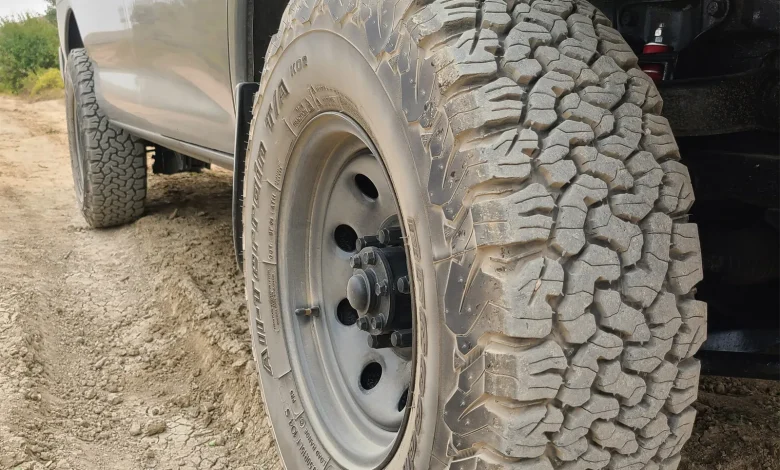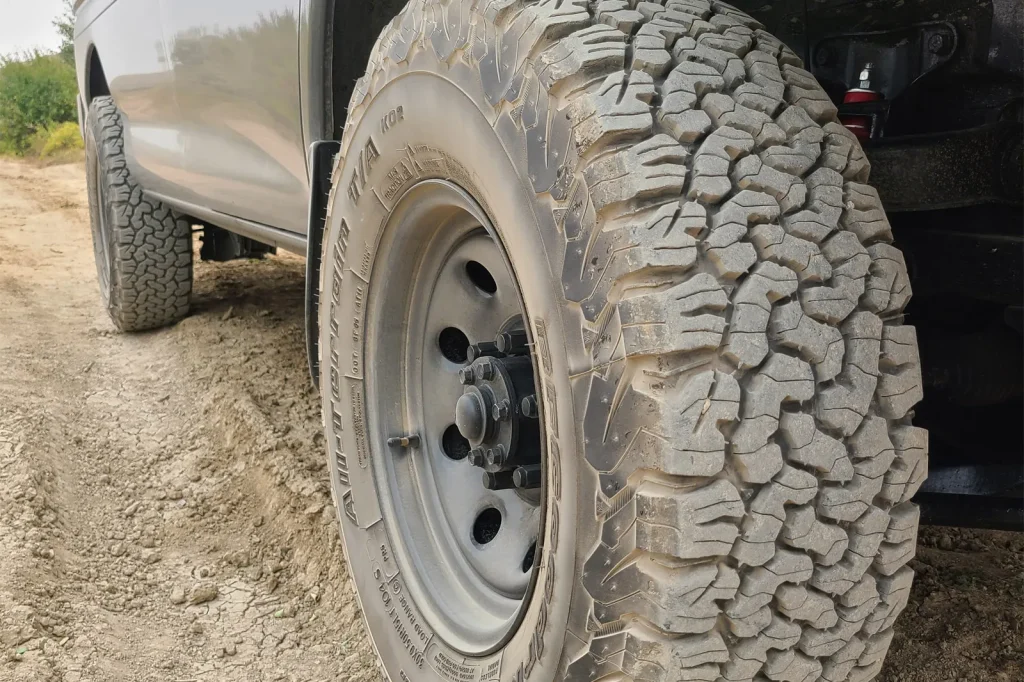What Are the Key Differences Between All Season and All Terrain Tires?

All-season tires are made to operate well in dry, rainy, and mild snowy situations throughout the year by striking a balance between comfort, handling, and longevity. They are perfect for drivers in areas with moderate weather since they offer a quiet, comfortable ride. All-terrain tires, on the other hand, are designed for off-road use and have a more aggressive tread pattern that improves traction on uneven terrain such as snow, mud, and gravel.
Usually, trucks and SUVs that frequently travel off the usual road are equipped with these tires. All-terrain tires may create more road noise and provide a rougher ride, but they also offer greater tough performance.
1. Difference Between All Season and All Terrain Tyres
Purpose
- All-season tires provide a balanced performance in dry, wet, and lightly snowy conditions, making them suitable for year-round use. In milder regions, they are ideal for daily driving.
- All-terrain tires offer better traction on areas like mud, gravel, sand, and snow since they are designed for off-road and rough terrain. For vehicles and SUVs utilized for off-road or outdoor driving, they are perfect.
Tread Pattern
- For a smoother ride on city streets and highways, all-season tires have a more consistent tread pattern. Extreme off-road settings are not intended for the tread; rather, it is made to withstand a range of circumstances.
- To improve traction on rough, off-road terrain, all-terrain tires feature an aggressive tread design with deeper, broader voids. This tread is more durable and made for harsh environments.
Ride Comfort
- On paved roads, all-season tires offer a more comfortable and quiet ride with reduced vibration and road noise.
- Because of their more aggressive tread, all-terrain tires can produce more road noise and may provide a harsher ride on highways.

2. All Season vs. All Terrain Tires: Which is the Better Fit for You?
It becomes more challenging to retain adequate traction when driving on ice or in a blizzard when using these tires. The rubber used to make all-season tires works best in temperatures between around 5 and 10 °C. In addition to using less fuel than all-terrain tires, all-season tires have less rolling friction. All-season treads can drive at higher speeds and allow for improved fuel economy, even if they do not have the same level of traction as all-terrain tires.
All-season tires are ideal for drivers who do not experience extreme weather since they provide a reliable and reasonably priced solution for daily driving.
3. Comparing the Two for Professionals With Auto Careers
All-Season Tires
Best for Everyday Driving
For daily driving, all-season tires are the best option. They are ideal for temperate conditions since they provide a well-balanced performance on dry, wet, and lightly snowy roads. These tires are made to last longer and offer good durability and fuel efficiency. They also give a smooth, comfortable ride with less road noise.
Cost-Efficiency
Because they offer dependable performance all year long and eliminate the need for seasonal tire changes, all-season tires are economical. They are a sensible and reasonably priced option for daily driving because they have a longer tread life, are more fuel-efficient, and require less maintenance.
Versatility
Because of their adaptability, all-season tires can be used in a variety of driving situations. They are perfect for year-round use in areas with moderate weather since they are made to deliver dependable performance on dry, wet, and lightly snowy roads. In addition to providing sufficient traction on various surfaces, the balanced tread pattern guarantees a comfortable and seamless ride.
All-Terrain Tires
Best for Off-Road and ragged Work
Because they provide better traction on gravel, dirt, and uneven terrain, all-terrain tires are ideal for off-road and harsh operations. Because they offer improved durability and stability on uneven terrain, they are perfect for professionals who drive in demanding areas, such as construction workers or those in agriculture.
Heavy-Duty Performance
All-terrain tires are made to endure the rigors of off-road driving and provide heavy-duty performance. They are ideal for vehicles employed in construction, agricultural, or outdoor work areas because they offer exceptional grip, endurance, and stability on rough, uneven ground.
Enhanced Safety
Because they offer superior traction and stability on uneven, difficult terrain, all-terrain tires increase safety. Because of this, they are perfect for off-road driving, which lowers the possibility of skidding or losing control in difficult situations like snow, gravel, or mud.
4. All Season vs. All Terrain Tires: Which is the Better Fit for You?
Because of their versatility, all-season tires offer a comfortable and smooth ride on paved roads in a variety of weather conditions, including light snow, rain, and dry conditions. They are a sensible option for commuters in temperate areas because they are perfect for daily driving, providing cheap maintenance, long tread life, and fuel efficiency.
All-terrain tires may create more road noise and provide a harsher ride on roads, but they perform exceptionally well in difficult situations. Whether you value efficiency and comfort on a daily basis or require strong performance for off-road excursions will ultimately determine which suits you best.
Conclusion
In the end, your driving requirements and conditions will determine whether you choose all-season or all-terrain tires. All-season tires are perfect for daily travel on paved roads in temperate climates because they provide year-round comfort, versatility, and fuel efficiency.
All-terrain tires, on the other hand, are great for dirt, light snow, and back roads. If you end up off-road or tripping over dirt roads on rough weekends, it might be your best option.
However, this is not a straightforward scenario. Your driving habits and the type of car you own will largely determine which tire is best for you.
FAQs
1. What are all-season tires best suited for?
Drivers who require dependable, year-round performance in temperate settings are the ideal candidates for all-season tires. They are perfect for daily commutes and city driving because they are made to withstand a range of road conditions, including dry, wet, and lightly snowy ones. Their well-balanced tread design maintains good traction and fuel efficiency while guaranteeing a comfortable and smooth ride.
2. Do all-season tires last longer than all-terrain tires?
Indeed, on paved roads, all-season tires typically outlast all-terrain tires. This is due to the fact that all-season tires have a tread pattern intended for even wear and increased mileage, making them suitable for daily driving in moderate weather. However, when used mostly on smooth, paved areas, all-terrain tires frequently experience faster tread wear because they are designed for durability and improved traction in off-road and rough settings.
3. Which tires are better for fuel efficiency?
Low-rolling-resistance tires are made to reduce the amount of energy lost during rolling, which improves fuel economy. Better gas mileage results from less energy being lost trying to overcome friction between the tire and the road.



